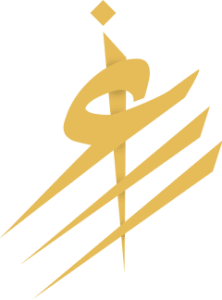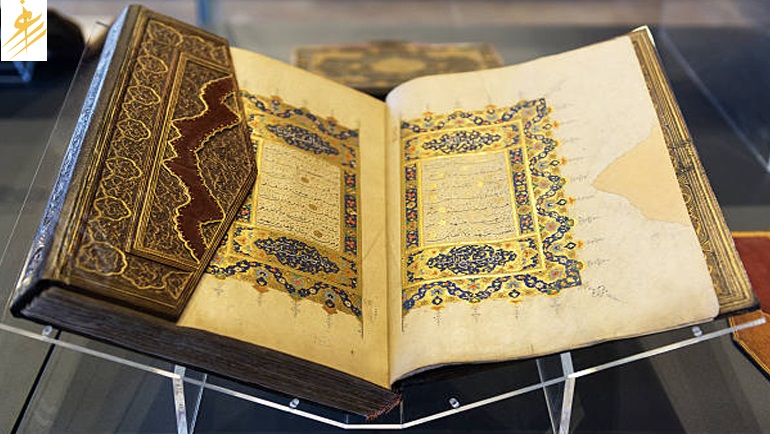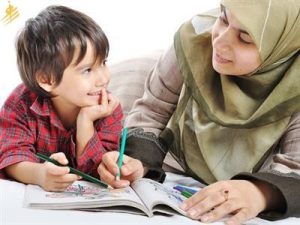Many ways can be followed to learn the Qur’an and recite it correctly. Including: receiving directly from scholars who specialize in reading the Qur’an, and taking care of it. One of the best ways to learn to read the Holy Qur’an correctly is; Taking the science of reading the Qur’an and its intonation from a specialized sheik, where the learner listens to his correct reading, and reads to him, to correct his reading and intonation, and from what is inferred the correctness of that approach in teaching the Qur’an; His saying – the Almighty -: (So if we recite it, then follow its recitation).
It should be noted that learning by receiving and orally is a condition in teaching the correct reading of the Qur’an because the fruits of learning the correct recitation of the Qur’an do not come by simply reading from books or the Qur’an, as that knowledge must be taken orally from a sheik or scholar, as the Noble Qur’an was revealed from the Preserved Tablet In the sky, to the heart of the Prophet – upon him be peace and blessings – through the Secretary of Revelation Jibril – upon him be peace – orally.
And the beholder in the science of recitation of the Qur’an realizes the truth of that knowledge, and that it is only taken from the mouths of the sheiks and reciters who are distinguished for perfection in reading, controlling judgments, and the exits of letters, and these issues are not achieved for the learner except by receiving, even if the reading is from an accurate Qur’an.
Among the useful ways to teach the recitation of the Qur’an, although it does not amount to the method of receiving; The method of listening to audio and visual Tajweed episodes and lessons, or reading the Qur’an with the teacher’s Qur’an, or reading it to a sheik electronically. Muslim scholars have compiled many works on the science of recitation of the Noble Qur’an.
Among the oldest works that dealt with the statement of that science as part of its investigations and chapters: Are the Book of Al-Ain for Khalil, and the Book of Sibawayh. As for the first attempt at authoring in that field; It was at the hands of Abi Muzahim Al-Khaqani, as he compiled Al-Nazuma Al-Ra’i, then Makki bin Abi Talib compiled the book Al-Rai’ah to improve the reading and achieve the pronunciation of the recitation, and also from the books: The Book of Determination in Itqan and Tajweed by Abi Amr Al-Dani, and the book “Umdat Al-Mufid” and “Adidah Al-Majid” known as Al-Nuniyah by Al-Sakhawi, and the book “Tajweed” For the Mourid by Ibn al-Faham al-Iskandari, the book al-Tamheed fi Ilm al-Tajweed by Ibn al-Jazari, the book Durrat al-Qari al-Majid fi Ahkam al-Qira’ wa al-Tajweed by Burhan al-Din al-Karaki, and other ancient and modern works.
The meaning of reading the Qur’an correctly
God Almighty commanded His faithful servants to read the Qur’an well. As reading it correctly, leads to understanding the intended meanings of the words of the surahs and verses, and thus is more conducive to understanding their purposes and goals, and what is meant by the correct reading of the Qur’an; Reading each letter of the Qur’an correctly, by showing its characteristics and exits that distinguish it from other letters, while being careful to read carefully, away from haste. Correct reading and good recitation. Imam Al-Bukhari included in his Sahih that the Prophet – upon him be peace and blessings be upon him – said to Abu Musa Al-Ash’ari when he listened to his reading: (I have been given a flute from the Psalms of the family of David).
The importance of learning to read the Qur’an correctly
The importance of learning to read the Qur’an correctly is evident in that it guarantees the learner many things, including accuracy of memorization and mastery in reading. By repetition and the correct recitation of the verses of the Qur’an, this is indicated by what was proven in the Sahih on the authority of the companion Abdullah bin Masoud – may God be pleased with him -: (The Messenger of God, may God’s prayers and peace be upon him, used to teach us the tashahhud as he would teach us the surah from the Qur’an), so the hadith indicates the Prophet’s keenness on him Prayers and peace – To correctly teach his companions all the rulings of the religion, including reading the Holy Qur’an, and Abdullah bin Masoud’s students were keen, including Ibrahim bin Yazid bin Qais Al-Nakhai, and Al-Aswad bin Yazid bin Qais Al-Nakhai; To learn the correct reading of the Qur’an on the authority of Ibn Masoud so that they agree with it the reading of the Prophet, and they have investigated the pronunciation of the letters correctly and meticulously, without replacing them with others. He made the recitation of the Qur’an and its intonation a criterion by which the accuracy of other recitations is measured, including the call to prayer, the tashahhud, the opening prayer, and the istikharah.
Providing the best reading of the Qur’an in leading the prayer, the Prophet – upon him be peace and blessings be upon him – made reading the Qur’an correctly a criterion in the preference of leading the prayer, as the best reading of the Book of God is the first of Muslims to lead the prayer, and the reading also includes mastery of it, and intonation correctly and meticulously, and the most memorized may be intended for the book of God.
Acquiring skill in reading the Qur’an is one of the reasons for attaining a high status with God Almighty, as it is proven in the Sahih from what Imam Muslim brought out in his Sahih on the authority of the Mother of the Believers, Aisha – may God be pleased with her – that the Prophet – upon him be blessings and peace – said: (The one who is skilled in the Qur’an is with those who travel The honorable, the righteous, and the one who recites the Qur’an and stutters in it, while it is difficult for him, will have two rewards.
The use of various methods in teaching the reading and recitation of the Qur’an. The Prophet – may God’s prayers and peace be upon him – was keen to diversify the methods to teach his companions – may God be pleased with them – the Holy Qur’an and its recitation, as he used to recite the Qur’an in aloud prayer, in individual and group education sessions, and individual recitation.






